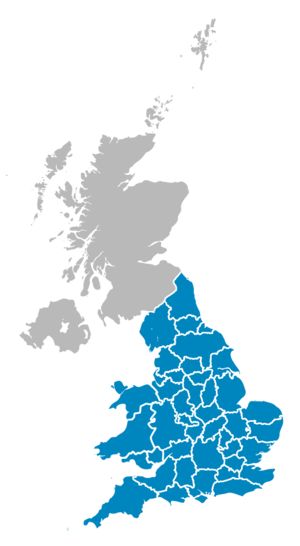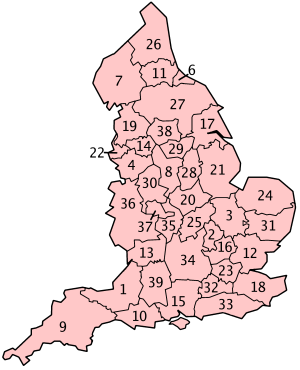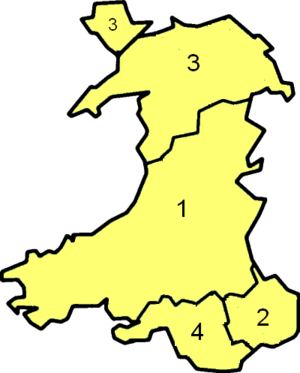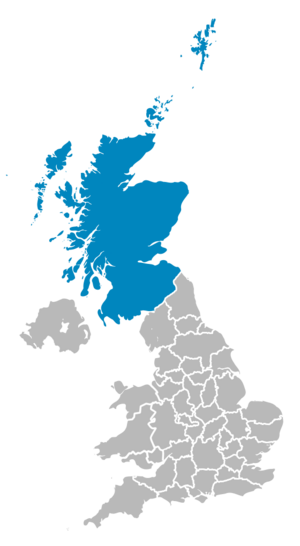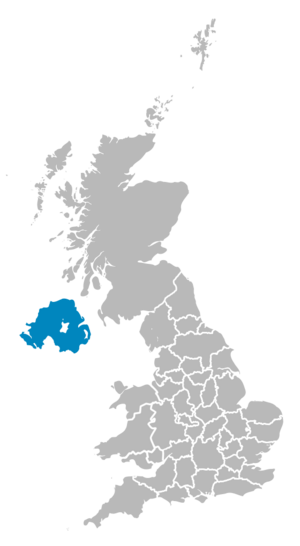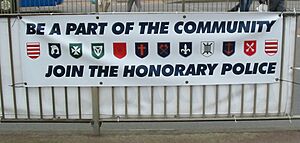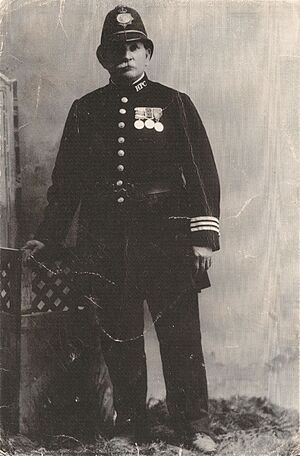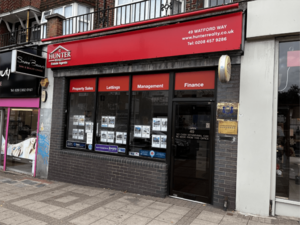List of law enforcement agencies in the United Kingdom, Crown Dependencies and British Overseas Territories facts for kids
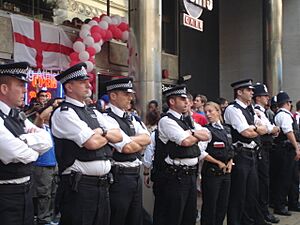
In the United Kingdom, many different groups work together to keep people safe and make sure laws are followed. These groups are called law enforcement agencies. They can be put into three main types:
- Local Police Forces: These are the most common police forces. They cover specific areas, like a county or a city, and handle most everyday policing.
- National Law Enforcement: These groups work across the whole country or have special jobs. An example is the National Crime Agency, which deals with serious crimes. The British Transport Police is another, looking after railways.
- Special Police Groups: These are smaller police groups that look after very specific places or activities, like ports, parks, or even cathedrals.
Most of the time, local police forces handle law enforcement for everyone. The other types of agencies focus on more specific tasks. Over time, many police forces in the UK have changed or joined together.
Contents
Local Police Forces
Most policing in the UK is done by 45 local police forces. These forces cover England, Wales, Scotland, and Northern Ireland. Each force is responsible for law and order in its own area. Scotland and Northern Ireland each have one national police force. England and Wales are split into many different police forces.
Here is how the local police forces are divided:
- 43 local police forces in England and Wales
- 1 local police force in Scotland
- 1 local police force in Northern Ireland
England and Wales
Police forces in England and Wales In England and Wales, each local police force covers one or more local government areas, like counties. These forces provide most of the police services to the public. They used to be called "Home Office police forces" because the Home Office (a government department) was in charge of them and gave them most of their money.
Even though the government helps fund them, each police force is independent. The top officer, called the chief constable (or Commissioner in London), makes the decisions about how the force operates. Local groups called police and crime commissioners now oversee these forces.
The Police Act 1996 is the main law that sets out the areas for the 43 police forces in England and Wales.
A "constable" is the lowest rank in the police. But all police officers, no matter their rank, have the legal powers of a constable. This means they can act as police officers anywhere in England and Wales. Special Constables are part-time, volunteer officers. Since 2007, they have the same full police powers as full-time officers. This is different from many other countries.
England
Police forces in England
- Avon and Somerset Police
- Bedfordshire Police
- Cambridgeshire Constabulary
- Cheshire Constabulary
- City of London Police (not shown on map)
- Cleveland Police
- Cumbria Constabulary
- Derbyshire Constabulary
- Devon and Cornwall Police
- Dorset Police
- Durham Constabulary
- Essex Police
- Gloucestershire Constabulary
- Greater Manchester Police
- Hampshire Constabulary
- Hertfordshire Constabulary
- Humberside Police
- Kent Police
- Lancashire Constabulary
- Leicestershire Police
- Lincolnshire Police
- Merseyside Police
- Metropolitan Police
- Norfolk Constabulary
- Northamptonshire Police
- Northumbria Police
- North Yorkshire Police
- Nottinghamshire Police
- South Yorkshire Police
- Staffordshire Police
- Suffolk Constabulary
- Surrey Police
- Sussex Police
- Thames Valley Police
- Warwickshire Police
- West Mercia Police
- West Midlands Police
- West Yorkshire Police
- Wiltshire Police
As of September 2020, police forces in England had:
- 124,492 police officers
- 8,634 special constables (volunteers)
- 8,659 police community support officers (PCSOs)
- 7,504 police support volunteers
- 76,466 staff
Wales
Police forces in Wales
- Dyfed-Powys Police (Heddlu Dyfed Powys)
- Gwent Police (Heddlu Gwent)
- North Wales Police (Heddlu Gogledd Cymru)
- South Wales Police (Heddlu De Cymru)
As of September 2020, police forces in Wales had:
- 7,274 police officers
- 492 special constables (volunteers)
- 834 police community support officers (PCSOs)
- 387 police support volunteers
- 4,774 staff
Teamwork Between Forces
Many police forces work together on special units. This helps them share skills and resources for bigger jobs. Some examples include:
- Units that deal with serious crime across different areas.
- Teams that handle armed operations or road policing for several forces.
- Units that gather information to prevent serious threats.
Scotland
Police Scotland The Scottish Government and Parliament are in charge of most police powers in Scotland. Before 2013, Scotland had eight local police forces. These forces covered different areas and provided most police services.
In 2013, these eight forces joined together to form one national police force called Police Scotland. This new force also took over the work of the Scottish Crime and Drug Enforcement Agency.
As of December 2019, police numbers in Scotland were:
- Police officers: 17,259
- Special constables (volunteers): 531
- Other staff: 6,168
Scotland does not have Police Community Support Officers (PCSOs).
Northern Ireland
Police Service of Northern Ireland Northern Ireland has one police force, the Police Service of Northern Ireland. This force was created in 2001, replacing the Royal Ulster Constabulary. The Police (Northern Ireland) Act 2000 sets out how this force is organised and what it does.
As of April 2007, police numbers in Northern Ireland were:
- Police officers: 7,216
- Full-time reserve police officers: 335
- Part-time police officers: 684
- Other staff: 2,265
Northern Ireland also does not employ Police Community Support Officers.
National Teams for All UK Police Forces
Some police units work across the whole United Kingdom, helping different forces.
- The National Wildlife Crime Unit gathers information on crimes against wildlife.
- The National Counter Terrorism Security Office advises the government on how to prevent serious threats.
- The National Vehicle Crime Intelligence Service fights organised car crime.
- The National Domestic Extremism and Disorder Intelligence Unit helps police deal with groups that cause public disorder.
- The Protection Command protects government officials, diplomats, and the Royal Family.
- The National Fraud Intelligence Bureau helps fight financial scams across the UK.
- The National Ballistics Intelligence Service tracks the criminal use of guns.
- The National Police Air Service provides air support (like helicopters) to police forces in England and Wales.
Special Police Forces
These three government agencies are called "special police forces." They look after specific areas of the country's important infrastructure. They are inspected by HMIC, a group that checks how police forces are doing.
- Ministry of Defence Police: This force provides security and investigates crimes at military sites across the UK.
- Civil Nuclear Constabulary: This force protects nuclear sites and nuclear materials being moved around the UK.
- British Transport Police: This force looks after railways and light-rail systems in Great Britain.
These special police forces can sometimes act outside their main areas. For example, if there's an emergency and the local police aren't available, they can step in to help.
Other Law Enforcement Groups
Besides the police, other groups also help enforce laws in the UK. Their officers are not always police officers, but they still have powers to make sure rules are followed.
Uniformed and Investigative Groups
- National Crime Agency (NCA): This agency leads the fight against serious organised crime across the UK. It also works with police forces in other countries.
- Gangmasters and Labour Abuse Authority (GLAA): This agency investigates people who exploit workers.
- His Majesty's Revenue and Customs (HMRC): These officers enforce tax and customs laws. They can arrest people and search goods.
- Border Force (BF): This group works at airports, seaports, and train stations. They control who enters and leaves the UK and check for illegal goods.
- Immigration Enforcement (IE): This group works to prevent people from breaking immigration laws in the UK.
- Environment Agency (England) and Natural Resources Wales (Wales): Their officers protect fish and stop crimes like illegal fishing.
- His Majesty's Prison Service (HMPS): Prison officers in England and Wales have police-like powers while working in prisons.
Groups with Limited Powers
- Driver and Vehicle Standards Agency (Great Britain) and Driver and Vehicle Agency (Northern Ireland): These agencies help make sure vehicles and drivers are safe on the roads.
- The Independent Office for Police Conduct (England and Wales): This group investigates complaints against police officers and staff from other law enforcement agencies.
Groups That Only Investigate
Some groups have powers to investigate but don't usually make arrests themselves.
- Office for Security and Counter-Terrorism: This office helps keep the country safe from serious threats.
- Security Service (MI5): This is the UK's domestic intelligence agency, working to protect national security.
- Serious Fraud Office: This office investigates and prosecutes serious and complex financial crimes.
Miscellaneous Police Forces
These are smaller police forces that often work for local councils, trusts, or private companies. They usually only have power in a specific area, like a port or a park. If something very serious happens, the main local police force will usually step in.
Ports Police
Ports police forces look after harbours and docks. Their officers have police powers on land owned by the port and up to one mile away.
Examples include:
- Belfast Harbour Police
- Port of Bristol Police
- Port of Felixstowe Police
- Port of Dover Police
Some other ports police forces, like the Port of Liverpool Police, have slightly different powers.
Parks Police
Some small police forces look after specific parks and lands. Their officers have police powers only within their park areas.
Examples include:
- Epping Forest Keepers
- Kew Constabulary (at the Royal Botanic Gardens)
In London, some local councils have parks police who enforce rules within their parks.
- Royal Borough of Kensington and Chelsea Parks Police
- Hampstead Heath Constabulary
- Wandsworth Parks and Events Police
Cathedral Constables
Some cathedrals have their own constables who help keep the peace there.
- York Minster Police
- Canterbury Cathedral Close Constables
Other Special Forces
- Belfast International Airport Constabulary: Police officers at Belfast International Airport.
- Cambridge University Constabulary: Police officers for Cambridge University and nearby areas.
- Mersey Tunnels Police: Police officers who look after the Mersey Tunnels and their approach roads.
Military Police
Each branch of the UK military has its own police force. They are called "service police." They look after military personnel and civilians who work with the military. They do not usually have police powers over the general public.
The service police include:
- Royal Navy Police (which includes the Royal Marines Police)
- Royal Military Police (for the Army)
- Royal Air Force Police (for the Air Force)
These military police forces are trained to investigate crimes, even serious ones, within the military.
Defence Security Groups
Other groups provide security at military bases in the UK and abroad.
- Northern Ireland Security Guard Service (NISGS): Civilian security officers who are armed and act as special constables in Northern Ireland.
- Military Provost Guard Service (MPGS): Army personnel who provide armed security at military sites in the UK.
Groups with Limited Enforcement Powers
Some other groups have special powers to enforce certain rules and laws, even if they are not police forces.
- Community Safety Accreditation Scheme (CSAS): Police forces can give limited powers to certain people, like council wardens or private security staff. These powers might include taking alcohol from underage people. Many different roles fall under this scheme, such as:
- Community protection officer
- Street marshal
- Park ranger
- Neighbourhood warden
- Hospital security guard
- Council officer
- Railway Byelaws: People who work for railway companies can make sure everyone follows the rules on trains and at stations.
Crown Dependencies
The Crown Dependencies are islands that are self-governing but are linked to the British Crown. They have their own law enforcement.
Isle of Man
- The Isle of Man Constabulary is the main police force.
- The Isle of Man Prison and Probation Service runs the island's only prison.
- Isle of Man Customs and Excise Division handles customs duties.
| Flag | Logo | Service/Force Name | Location | Information |
|---|---|---|---|---|
| Isle of Man Constabulary (Meoiryn-Shee Ellan Vannin) |
Isle of Man | Main police force for the island. | ||
| Flag | Logo | Service/Force Name | Location | Information |
| Isle of Man Customs and Excise Division | Isle of Man | Handles customs duties. | ||
| Flag | Logo | Service/Force Name | Location | Information |
| Isle of Man Prison and Probation Service | Isle of Man | Runs the prison and probation services. |
Bailiwick of Jersey
- The States of Jersey Police is the main police force for Jersey.
- States of Jersey Customs and Immigration Service handles customs and immigration.
- Honorary Police: These are volunteer police officers elected by people in each parish (local area) in Jersey. They help keep law and order in their parish.
- Jersey Prison Service runs the prison.
| Flag | Logo | Service/Force Name | Location | Information |
|---|---|---|---|---|
| States of Jersey Police (Police d'États de Jersey) |
Jersey | Main police force for the island. | ||
| Flag | Logo | Service/Force Name | Location | Information |
| States of Jersey Customs and Immigration Service | Jersey | Handles customs and immigration. | ||
| Flag | Logo | Service/Force Name | Location | Information |
| Honorary Police (French: Police Honorifique) | Jersey | Volunteer police who maintain law and order in their parish. | ||
| Flag | Logo | Service/Force Name | Location | Information |
| Jersey Prison Service | HM Prison La Moye | Runs the prison. |
Bailiwick of Guernsey
- The States of Guernsey Police Service is the main police force for Guernsey and nearby islands like Alderney.
- Guernsey Border Agency handles border control, customs, and immigration.
- Guernsey Prison Service runs the main prison.
| Flag | Logo | Service/Force Name | Location | Information |
|---|---|---|---|---|
| States of Guernsey Police Service (États de Guernesey Service de police) | Guernsey | Main police force for the island. | ||
| Flag | Logo | Service/Force Name | Location | Information |
| Guernsey Border Agency | Guernsey | Handles customs and immigration. | ||
| Flag | Logo | Service/Force Name | Location | Information |
| Guernsey Prison Service | HMP Guernsey | Runs the prison. |
Overseas Territories
The British Overseas Territories are islands or areas that belong to the UK. They often have their own local governments, but the UK government is still responsible for important things like defence and security. This means their police forces are often overseen by the Governor.
Law enforcement in these territories is similar to the UK, but with some local differences. Many of these agencies have been around for a very long time.
Civilian Police Forces
Most British Overseas Territories have their own civilian police forces. Some forces might cover more than one island.
| Name of Territory | Flag | Civilian Police force/service | Location | Information |
|---|---|---|---|---|
| Sovereign Base Areas, Cyprus | Cyprus | Civilian police for the UK military bases. | ||
| Anguilla | Caribbean | |||
| Bermuda | North Atlantic Ocean | |||
| British Indian Ocean Territory | Indian Ocean | These police are serving military police from the British Armed Forces. | ||
| British Virgin Islands | Royal Virgin Islands Police Force (RVIPF) | Caribbean | ||
| Cayman Islands | Royal Cayman Islands Police Service (RCIP) | Caribbean | ||
| Falkland Islands | Royal Falkland Islands Police (RFIP) | South Atlantic Ocean | Military police on the island can also act as RFIP reserve constables. | |
| Gibraltar | Royal Gibraltar Police (RGP) | Iberian Peninsula | ||
| Montserrat | Royal Montserrat Police Service (RMPS) | Caribbean | ||
| Pitcairn Islands | see Law enforcement in the Pitcairn Islands (officers from New Zealand Police) | Pacific Ocean | Police officers from New Zealand help police the island. | |
| Saint Helena, Ascension and Tristan da Cunha | South Atlantic Ocean | This force polices all three islands. | ||
| South Georgia and the South Sandwich Islands | Reserve police officers (from Royal Falkland Islands Police) | South Atlantic Ocean | The Chief of Police is also the Chief of the Royal Falkland Islands Police. | |
| Turks and Caicos Islands | Royal Turks and Caicos Islands Police Force (RTCIPF) | North Atlantic Ocean | One of the oldest forces, started in 1799. |
List of Civilian Police Forces
- Bermuda Police Service
- Bermuda Airport Security Police
- Royal Anguilla Police Force
- Pitcairn Islands Police
- Royal Cayman Islands Police Service
- Royal Falkland Islands Police
- Royal Montserrat Police Force
- Royal Virgin Islands Police Force
- Royal Saint Helena Police Service
- Royal Gibraltar Police
- Royal Turks and Caicos Islands Police Force
Ministry of Defence Overseas Police
- Sovereign Base Areas Police (Cyprus): Polices the UK military bases in Cyprus.
- Gibraltar Defence Police: Polices all defence areas and personnel in Gibraltar.
Overseas Military Police
- British Indian Ocean Territory Police: Military police who act as the police for this territory.
- Cyprus Joint Police Unit: Military police from all three UK armed services.
- Falkland Islands Joint Service Police Security Unit: Military police from all three UK armed services.
- Gibraltar Joint Provost and Security Unit: Military police from all three UK armed services.
Prison Services Overseas
Many Overseas Territories also have their own prison services, like:
- His Majesty's Prison Service Turks and Caicos
- Bermuda Department of Corrections
- His Majesty's Prison Gibraltar
Customs, Immigration, and Border Control Overseas
These territories also have agencies that handle customs, immigration, and border control.
- His Majesty's Customs (Gibraltar)
- Border and Coastguard Agency (Gibraltar)
- Turks & Caicos Customs Department
- Cayman Islands Customs and Border Control (CBC)
Overseas Law Enforcement in the UK
Sometimes, police forces from other countries can operate in a limited way in the UK:
- Garda Síochána (Irish Police): They are allowed to inspect the Sellafield nuclear facility in Cumbria, England, under an agreement.
- Police aux Frontières (French Border Police): As part of the Channel Tunnel agreement, French police are present at UK train stations that serve the Eurostar. This helps with border checks before people travel to France. British Transport Police have a similar arrangement in Paris.
- Military police from visiting forces: Military police from other countries can operate in the UK under special agreements when their forces are visiting.
- Chinese police overseas service stations: These stations in the UK are not legally allowed by the UK government to do any law enforcement work.
See also
- Battenburg markings
- Sillitoe tartan
- Jam sandwich (slang)
- List of defunct law enforcement agencies in the United Kingdom
- List of law enforcement agencies in England and Wales
- List of law enforcement agencies in Northern Ireland
- List of law enforcement agencies in Scotland
- List of United Kingdom uniformed services
- Law enforcement in the United Kingdom
- Table of police forces in the United Kingdom
- Collar number
- Warrant card
- Royal Hong Kong Police Force


